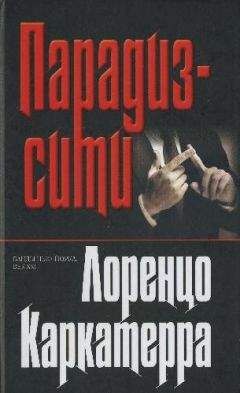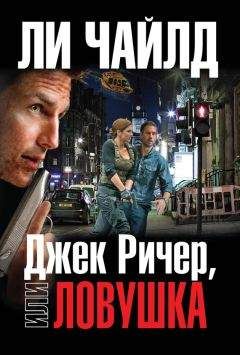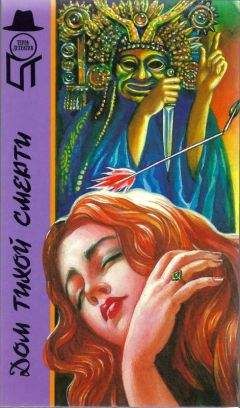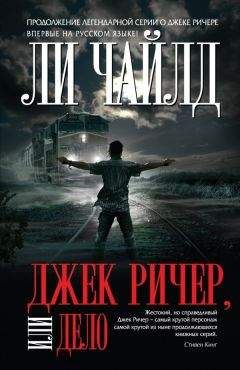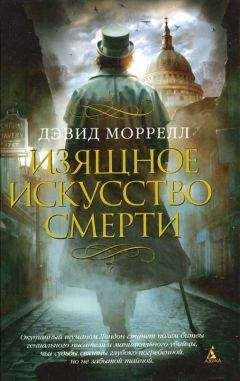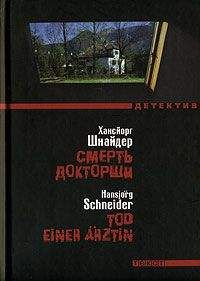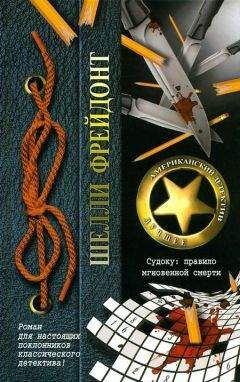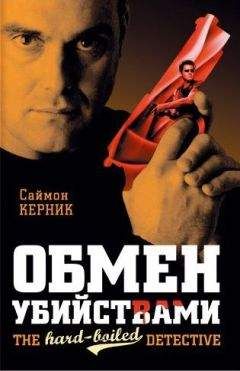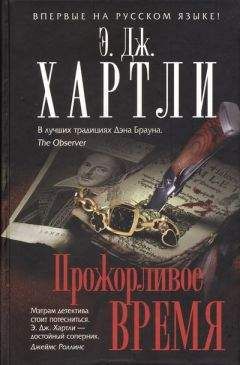Ли Чайлд - "Этаж смерти" with W_cat
Скачивание начинается... Если скачивание не началось автоматически, пожалуйста нажмите на эту ссылку.
Жалоба
Напишите нам, и мы в срочном порядке примем меры.
Описание книги ""Этаж смерти" with W_cat"
Описание и краткое содержание ""Этаж смерти" with W_cat" читать бесплатно онлайн.
Маргрейв — крохотный идеальный городок. Настолько идеальный, что это пугает.
Бывший военный полицейский Джек Ричер, ведущий кочевой образ жизни, приходит в Маргрейв, намереваясь покинуть город через пару дней. Однако в этот момент в Маргрейве происходит первое убийство за тридцать лет. Его вешают на Ричера, единственного чужака в городе. И для него начинается кошмар... первым действием которого становятся выходные в тюрьме, на этаже смерти, в обществе заключенных, отбывающих пожизненное заключение.
По мере того, как начинают просачиваться отвратительные тайны смертельного заговора, поглотившего весь город, растет счет трупам. И смерть становится эпидемией.
[329] “They want a warrant,” he said.
[330] “But you need to know whose number it is, right?” I said.
[331] “You know some way of doing that without a warrant?” he asked.
[332] “Maybe,” I said. “Why don’t you just call it up and see who answers?”
[333] They hadn’t thought of that. There was another silence. They were embarrassed. They didn’t want to look at each other. Or me. Silence.
[334] Baker bailed out of the situation. Left Finlay holding the ball. He collected the files and mimed going outside to work on them. Finlay nodded and waved him away. Baker got up and went out. Closed the door very quietly indeed. Finlay opened his mouth. And closed it. He needed to save some face. Badly.
[335] “It’s a mobile,” he said. “If I call it up I can’t tell whose it is or where it is.”
[336] “Listen, Finlay,” I said. “I don’t care whose it is. All I care is whose it isn’t. Understand? It isn’t my phone. So you call it up and John Doe in Atlanta or Jane Doe in Charleston answers it. Then you know it isn’t mine.”
[337] Finlay gazed at me. Drummed his fingers on the desk. Kept quiet.
[338] “You know how to do this,” I said. “Call the number, some bullshit story about a technical fault or an unpaid bill, some computer thing, get the person to confirm name and address. Do it, Finlay, you’re supposed to be a damn detective.”
[339] He leaned forward to where he had left the number. Slid the paper back with his long brown fingers. Reversed it so he could read it and picked up the phone. Dialed the number. Hit the speakerphone button. The ring tone filled the air. Not a sonorous long tone like a home phone. A high, urgent electronic sound. It stopped. The phone was answered.
[340] “Paul Hubble,” a voice said. “How may I help you?”
[341] A southern accent. A confident manner. Accustomed to telephones.
[342] “Mr. Hubble?” Finlay said. He was looking at the desk, writing down the name. “Good afternoon. This is the phone company, mobile division. Engineering manager. We’ve had a fault reported on your number.”
[343] “A fault?” the voice said. “Seems OK to me. I didn’t report a fault.”
[344] “Calling out should be OK,” Finlay said. “It’s reaching you that may have been a problem, sir. I’ve got our signal-strength meter connected right now, and actually, sir, it’s reading a bit low.”
[345] “I can hear you OK,” the voice said.
[346] “Hello?” Finlay said. “You’re fading a bit, Mr. Hubble. Hello? It would help me to know the exact geographic location of your phone, sir, you know, right now, in relation to our transmitting stations.”
[347] “I’m right here at home,” said the voice.
[348] “OK,” Finlay said. He picked up his pen again. “Could you just confirm that exact address for me?”
[349] “Don’t you have my address?” the voice said. Man-to-man jocular stuff. “You seem to manage to send me a bill every month.”
[350] Finlay glanced at me. I was smiling at him. He made a face.
[351] “I’m here in engineering right now, sir,” he said. Also jocular. Just two regular guys battling technology. “Customer details are in a different department. I could access that data, but it would take a minute, you know how it is. Also, sir, you’ve got to keep talking anyway while this meter is connected to give me an exact strength reading, you know? You may as well recite your address, unless you’ve got a favorite poem or anything.”
[352] The tinny speakerphone relayed a laugh from the guy called Hubble.
[353] “OK, here goes, testing, testing,” his voice said. “This is Paul Hubble, right here at home, that’s number twenty-five Beckman Drive, I say again, zero-two-five Beckman Drive, down here in little old Margrave, that’s M-A-R-G-R-A-V-E in the State of Georgia, U.S.A. How am I doing on my signal strength?”
[354] Finlay didn’t respond. He was looking very worried.
[355] “Hello?” the voice said. “Are you still there?”
[356] “Yes, Mr. Hubble,” Finlay said. “I’m right here. Can’t find any problem at all, sir. Just a false alarm, I guess. Thank you for your help.”
[357] “OK,” said the guy called Hubble. “You’re welcome.”
[358] The connection broke and a dial tone filled the room. Finlay replaced the phone. Leaned back and looked up at the ceiling. Spoke to himself.
[359] “Shit,” he said. “Right here in town. Who the hell is this Paul Hubble?”
[360] “You don’t know the guy?” I said.
[361] He looked at me. A bit rueful. Like he’d forgotten I was there.
[362] “I’ve only been here six months,” he said. “I don’t know everybody.”
[363] He leaned forward and buzzed the intercom button on the rosewood desk. Called Baker back in.
[364] “Ever heard of some guy called Hubble?” Finlay asked him. “Paul Hubble, lives here in town, twenty-five Beckman Drive?”
[365] “Paul Hubble?” Baker said. “Sure. He lives here, like you say, always has. Family man. Stevenson knows him, some kind of an in-law or something. They’re friendly, I think. Go bowling together. Hubble’s a banker. Some kind of a financial guy, you know, a big-shot executive type, works up in Atlanta. Some big bank up there. I see him around, time to time.”
[366] Finlay looked at him.
[367] “He’s the guy on the other end of this number,” he said.
[368] “Hubble?” Baker said. “Right here in Margrave? That’s a hell of a thing.”
[369] Finlay turned back to me.
[370] “I suppose you’re going to say you never heard of this guy?” he asked me.
[371] “Never heard of him,” I said.
[372] He glared at me briefly. Turned back to Baker.
[373] “You better go on out and bring this Hubble guy in,” he said. “Twenty-five Beckman Drive. God knows what he’s got to do with anything, but we better talk to him. Go easy on him, you know, he’s probably a respectable guy.”
[374] He glared at me again and left the room. Banged the heavy door. Baker reached over and stopped the recording machine. Walked me out of the office. Back to the cell. I went in. He followed and removed the handcuffs. Put them back on his belt. Stepped back out and closed the gate. Operated the lock. The electric bolts snicked home. He walked away.
[375] “Hey, Baker,” I called.
[376] He turned and walked back. A level gaze. Not friendly.
[377] “I want something to eat,” I said. “And coffee.”
[378] “You’ll eat up at the state facility,” he said. “Bus comes by at six.”
[379] He walked away. He had to go and fetch the Hubble guy. He would shuffle up to him apologetically. Ask him to come down to the station house, where Finlay would be polite to him. While I stood in a cell, Finlay would politely ask Hubble why his phone number had been found in a dead man’s shoe.
[380] MY COAT WAS STILL BALLED UP ON THE CELL FLOOR. I shook it out and put it on. I was cold again. Thrust my hands into the pockets. Leaned on the bars and tried to read through the newspaper again, just to pass the time. But I wasn’t taking anything in. I was thinking about somebody who had watched his partner shoot a guy in the head. Who had seized the twitching body and kicked it around the floor. Who had used enough furious force to smash all the dead inert bones. I was standing there thinking about stuff I’d thought I was through with. Stuff I didn’t want to think about anymore. So I dropped the paper on the carpet and tried to think about something else.
[381] I found that if I leaned up in the front far corner of the cell I could see the whole of the open-plan area. I could see over the reception counter and out through the glass doors. Outside, the afternoon sun looked bright and hot. It looked like a dry and dusty place again. The heavy rain had moved on out. Inside was cool and fluorescent. The desk sergeant sat up on a stool. He worked on his keyboard. Probably filing. I could see behind his counter. Underneath were spaces designed not to be seen from the front. Neat compartments contained papers and hardback folders. There were sections with Mace sprays. A shotgun. Panic buttons. Behind the desk sergeant the uniformed woman who’d printed me was busy. Keyboard work. The large room was quiet but it hummed with the energy of investigation.
4
[382] PEOPLE SPEND THOUSANDS OF DOLLARS ON STEREOS. SOMETIMES tens of thousands. There is a specialist industry right here in the States which builds stereo gear to a standard you wouldn’t believe. Tubed amplifiers which cost more than a house. Speakers taller than me. Cables thicker than a garden hose. Some army guys had that stuff. I’d heard it on bases around the world. Wonderful. But they were wasting their money. Because the best stereo in the world is free. Inside your head. It sounds as good as you want it to. As loud as you want it to be.
[383] I was leaning up in my corner running a Bobby Bland number through my head. An old favorite. It was cranked up real loud. “Further On Up the Road.” Bobby Bland sings it in G major. That key gives it a strange, sunny, cheerful cast. Takes out the spiteful sting from the lyric. Makes it a lament, a prediction, a consolation. Makes it do what the blues is supposed to do. The relaxed G major misting it almost into sweetness. Not vicious.
[384] But then I saw the fat police chief walk by. Morrison, on his way past the cells, toward the big office in back. Just in time for the start of the third verse. I crunched the song down into E flat. A dark and menacing key. The real blues key. I deleted the amiable Bobby Bland. I needed a harder voice. Something much more vicious. Musical, but a real cigarettes-and-whiskey rasp. Maybe Wild Child Butler. Someone you wouldn’t want to mess with. I wound the level in my head up higher, for the part about reaping what you sow, further on up the road.
[385] Morrison was lying about last night. I hadn’t been there at midnight. For a while I had been prepared to accept the possibility of a mistake. Maybe he had seen someone who looked like me. But that was giving him the benefit of the doubt. Right now I wanted to give him a forearm smash to the face. Burst his fat nose all over the place. I closed my eyes. Wild Child Butler and I promised ourselves it would happen. Further on up the road.
[386] I OPENED MY EYES AND SWITCHED OFF THE MUSIC IN MY head. Standing in front of me on the other side of the bars was the fingerprint officer. She was on her way back from the coffee hotplate.
[387] “Can I get you a cup of coffee?” she asked me.
[388] “Sure,” I said. “Great. No cream, no sugar.”
[389] She put her own cup down on the nearest desk and went back to the machine. Poured me a cup from the pot and walked back. This was a good-looking woman. About thirty, dark, not tall. But to call her medium would be unfair to her. She had a kind of vitality. It had come across as a sympathetic briskness in that first interview room. A professional bustle. Now she seemed unofficial. Probably was. Probably against the fat chief’s rules to bring coffee to the condemned man. It made me like her.
[390] She passed the cup in through the bars. Up close she looked good. Smelled good. I didn’t recall that from earlier. I remembered thinking of her like a dentist’s nurse. If dentist’s nurses all looked that good, I’d have gone more often. I took the cup. I was glad of it. I was thirsty and I love coffee. Give me the chance and I drink coffee like an alcoholic drinks vodka. I took a sip. Good coffee. I raised the cup like a toast.
[391] “Thank you,” I said.
[392] “You’re welcome,” she said, and she smiled, with her eyes too. I smiled back. Her eyes were like a welcome blast of sunshine on a rotten afternoon.
[393] “So you think I didn’t do it?” I asked her.
[394] She picked up her own cup from where she’d put it down.
[395] “You think I don’t bring coffee to the guilty ones?” she said.
[396] “Maybe you don’t even talk to the guilty ones,” I said.
[397] “I know you’re not guilty of much,” she said.
[398] “How can you tell?” I said. “Because my eyes aren’t too close together?”
[399] “No, fool,” she laughed. “Because we haven’t heard from Washington yet.”
[400] Her laugh was great. I wanted to look at her nameplate over her shirt pocket. But I didn’t want her to think I was looking at her breasts. I remembered them resting on the edge of the table when she took my photograph. I looked. Nice breasts. Her name was Roscoe. She glanced around quickly and moved closer to the bars. I sipped coffee.
[401] “I sent your prints to Washington over the computer link,” she said. “That was at twelve thirty-six. Big database there, you know, FBI? Millions of prints in their computer. Prints that get sent in are checked. There’s a priority order. You get checked first of all against the top-ten wanted list, then the top hundred, then the top thousand, you understand? If you’d been near the top, you know, active and unsolved, we’d have heard almost right away. It’s automatic. They don’t want any big fugitive to slip away, so the system gets right back. But you’ve been in there almost three hours and we haven’t heard. So I can tell you’re not on record for anything very bad.”
[402] The desk sergeant was looking over. Disapproving. She was going to have to go. I drained the coffee and handed her the cup back through the bars.
[403] “I’m not on record for anything at all,” I said.
[404] “No,” she said. “You don’t match the deviance profile.”
[405] “I don’t?” I said.
[406] “I could tell right away.” She smiled. “You got nice eyes.”
[407] She winked and walked away. Trashed the cups and moved over to her workstation. She sat down. All I could see was the back of her head. I moved into my corner and leaned up against the hard bars. I’d been a lonely wanderer for six months. I’d learned something. Like Blanche in that old movie, a wanderer depends on the kindness of strangers. Not for anything specific or material. For morale. I gazed at the back of Roscoe’s head and smiled. I liked her.
[408] BAKER HAD BEEN GONE MAYBE TWENTY MINUTES. LONG enough to get back from Hubble’s place, wherever it was. I figured you could walk there and back in twenty minutes. This was a small town, right? A dot on the map. I figured you could walk anywhere and back in twenty minutes. On your hands. Although the town limits were pretty weird. Depended whether Hubble lived in town, or somewhere else within the outer boundaries. According to my experience, you were in town even when you were fourteen miles away. If that fourteen miles extended in all directions, then Margrave was about as big as New York City.
[409] Baker had said Hubble was a family man. A banker who worked in Atlanta. That meant a family house somewhere near town. Near schools and friends for the kids. Near shops and the country club for the wife. An easy drive for him up the county road to the highway. Convenient commute up the highway to the office in the big city. The address sounded like a town address. Twenty-five Beckman Drive. Not too close to Main Street. Probably Beckman Drive ran from the center of town out into the countryside. Hubble was a financial guy. Probably rich. Probably had a big white place on a big lot. Shade trees. Maybe a pool. Call it four acres. A square lot covering four acres was about a hundred and forty yards on a side. Homes on the left and the right of the street put number twenty-five about twelve lots out from town. About a mile, maybe.
Подписывайтесь на наши страницы в социальных сетях.
Будьте в курсе последних книжных новинок, комментируйте, обсуждайте. Мы ждём Вас!
Похожие книги на ""Этаж смерти" with W_cat"
Книги похожие на ""Этаж смерти" with W_cat" читать онлайн или скачать бесплатно полные версии.
Мы рекомендуем Вам зарегистрироваться либо войти на сайт под своим именем.
Отзывы о "Ли Чайлд - "Этаж смерти" with W_cat"
Отзывы читателей о книге ""Этаж смерти" with W_cat", комментарии и мнения людей о произведении.





